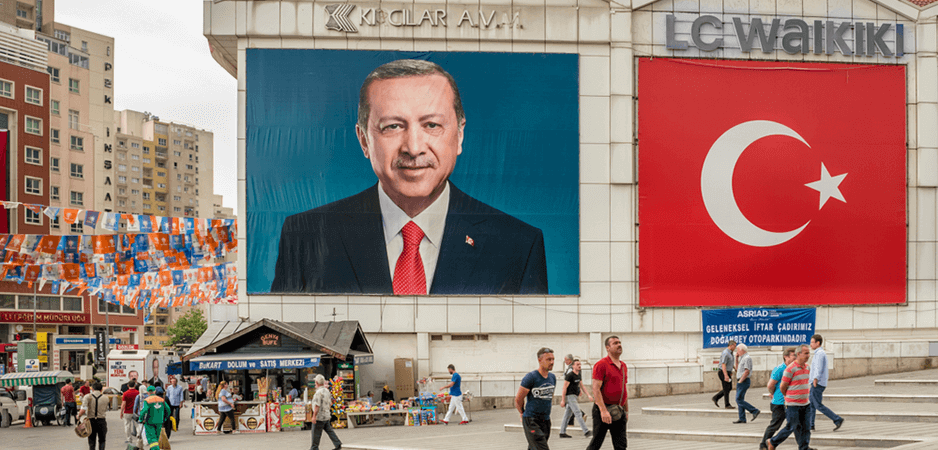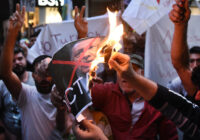Never mind who’s afraid of President Erdogan — what about his supporters’ fear of life without him?
When Turks go to the polls on June 24 — only a little over a year since the controversial referendum that paved the way for a new presidential system of government — the question of fear will be central to most narratives. The most dominant of these, certainly outside the country, is the one broadly attached to the opposition: the fear of another victory for President Recep Tayyip Erdogan and his consolidation of power.
This narrative is well worn in Western media. It has many advocates within Turkey and among Turks abroad, as well as much hard evidence to support it. There is also — particularly after the slim margin of victory in the 2017 referendum — the suspicion of potential electoral fraud. But against this backdrop is also another awkward, yet important, truth: President Erdogan still commands huge support.
Were Turkey a true dictatorship, as it is increasingly portrayed under Erdogan, he would have no electoral challengers, except perhaps for a few late entrants who suddenly and mysteriously realized a desire to run for president, despite being long-standing stalwart supporters of the incumbent. Instead, Turkey has a genuine field of candidates who are most definitely independent of President Erdogan and his Justice and Development Party (AKP).
Turkey is still a functioning, if dysfunctional, democracy. President Erdogan and the AKP could lose. But they probably won’t. This is due in large part — with all the intimidation, jailing of candidates and control of the national media excepted — to his enduring appeal for a large sector of Turkish society. While fear of Erdogan is well known and well documented, what about fear of life without Erdogan? What is it that AKP voters most fear?
Clear and present danger: the opposition fear
Fear of President Erdogan has become an almost all-pervasive narrative in opposition circles. Critics point to his majoritarian conception of democracy, his illiberal instincts, the muzzling of the media, jailing of journalists and opposition politicians, and the steady weakening of the rule of law as the judiciary and even financial institutions become more and more beholden to the president. What is less often cited is the increasing unease of many in his own party.
For many members of the ruling Justice and Development Party, the erosion of open borders, a soft power foreign policy and democratic foundations within the country are seen not as an erosion of traditional Turkish principles, but of principles championed by the AKP itself. Look to a major figure such as former Prime Minister Ahmet Davutoglu, and we see a man who led policies of “zero problems with neighbors” and “strategic depth” that have been abandoned.
In another clear sign of the division in the ruling party, rumors swirled briefly in May of former President Abdullah Gul — a founder of the AKP — running for president against Erdogan. In the event, he didn’t risk the challenge, yet there is a sense of potential momentum in this election. “It will be the most unpredictable election ever,” suggested a political observer in Istanbul who wished to remain anonymous. “Not even expert public opinion pollsters know what is going to happen.”
“I personally believe that the chances of a surprise victory for the opposition have significantly increased,” said the observer. He cited the victimization of the Kurdish and left-wing party, the Peoples’ Democratic Party (HDP), and the successful left-wing populist campaign of Muharrem Ince, candidate for the main opposition Republican People’s Party (CHP). He also believed President Erdogan’s numerous public gaffes, such as acknowledging that the National Intelligence Organization (MIT) has been used to spy on the opposition campaign and threatening the death penalty for HDP candidate Selahattin Demirtas, had undermined the confidence of moderates.
Bugün #TekMilletTekYürek diyerek asaletini tüm dünyaya bir kez daha gösteren milletime şükranlarımı sunuyorum. pic.twitter.com/depbcum02X
— Recep Tayyip Erdoğan (@RT_Erdogan) August 7, 2016
Enduring threats: Fear of life without Erdogan
Demirtas is the charismatic figurehead for the Kurdish political movement in Turkey, though he is viewed by many as a mouthpiece for the other jailed Kurdish leader, Abdullah Ocalan. The threat to execute a popular politician is no idle threat in a country that did just that following the coup of 1960. Adnan Menderes was the leader of the Democratic Party, which ruled for a decade in the 1950s following an early multi-party experiment in the Kemalist state.
Following the party’s fall in a military coup, the coup leaders chose to execute Menderes by hanging, an act that still casts a long shadow over Turkish politics. It is one small window into the minds of those who support President Erdogan and his ruling AKP. Like Menderes and his party, Erdogan and the AKP came to political prominence through popular support at the ballot box, not through military tutelage. They too spoke for a largely disenfranchised provincial electorate of pious Turks who had never wholly embraced Kemalism.
Despite all the turmoil of the last few years, and all the illiberalism exhibited by President Erdogan, his supporters have the whole 20th century to reference in considering where their interests lie. It was a century dominated by the staunchly secularist Kemalist elite, supported by a military that was ready to defend the state created by founder Kemal Ataturk, even against the popular will of its citizens. Long years of cultural and religious oppression are not easily forgotten.
Just because I’m paranoid…
Erdogan is a personification of this history. He was himself jailed by the Kemalist establishment in 1998 for the crime of reading a poem by the Turkish nationalist Ziya Gokalp that spoke of how “the minarets shall be our bayonets” — a reference that whiffed of Islamism to the Turkish elite of the era. Perhaps even more acutely, the AKP constituency has the failed coup of 2016 to consider now. Though it has been surprisingly quickly forgotten in Western media against the prominent post-coup purge, what occurred on July 15, 2016, is now central to President Erdogan and to his support.
For all that he and his ruling circle can now appear paranoid, defensive and illiberal, it cannot be denied — beyond conspiracy theories of a false flag operation — that Erdogan’s administration was the victim of a violent attempted coup. It claimed the lives of over 200 people, involved elements in the air force who bombed key government buildings, and even the hotel in Marmaris where the president was staying that night. Whatever we may think of the likes of US President Donald Trump or British Prime Minister Theresa May, neither has been subjected to such action from within their own state.
Consider for a moment what that means to a man in Erdogan’s position. He is a combative leader, determined to not only bring his constituency within the country representation, but real power and influence. Turkey is no stranger to the military coup, but for an attempt to have occurred in 2016 was, nevertheless, an audacious surprise in a country now wary of such practices. Moreover, in the shadow of Menderes, President Erdogan can have been pretty sure that night of what his fate might so easily have been.
In such a political climate, it is easy — perhaps not that surprising — that a leader would move toward illiberalism, toward a majoritarian vision that rested on the knowledge that unless you hold the power, those who do will not hesitate to oppress you. Unlike what might now be seen as the “AKP Spring” of the early 21st century, Erdogan’s trajectory now borrows much from the lessons of the rule of Ataturk himself, who erred on the side of one man, one party rule — strength and stability for the good of the nation. There are many for whom that message still rings true.
The views expressed in this article are the author’s own and do not necessarily reflect Fair Observer’s editorial policy.
Photo Credit: isa_ozdere / Shutterstock.com
Support Fair Observer
We rely on your support for our independence, diversity and quality.
For more than 10 years, Fair Observer has been free, fair and independent. No billionaire owns us, no advertisers control us. We are a reader-supported nonprofit. Unlike many other publications, we keep our content free for readers regardless of where they live or whether they can afford to pay. We have no paywalls and no ads.
In the post-truth era of fake news, echo chambers and filter bubbles, we publish a plurality of perspectives from around the world. Anyone can publish with us, but everyone goes through a rigorous editorial process. So, you get fact-checked, well-reasoned content instead of noise.
We publish 2,500+ voices from 90+ countries. We also conduct education and training programs
on subjects ranging from digital media and journalism to writing and critical thinking. This
doesn’t come cheap. Servers, editors, trainers and web developers cost
money.
Please consider supporting us on a regular basis as a recurring donor or a
sustaining member.
Will you support FO’s journalism?
We rely on your support for our independence, diversity and quality.






